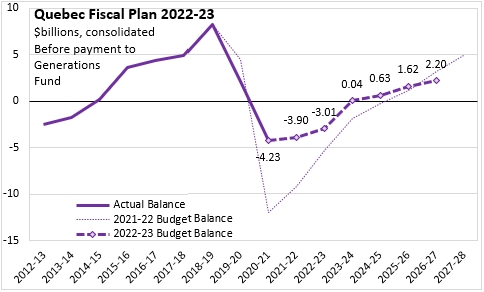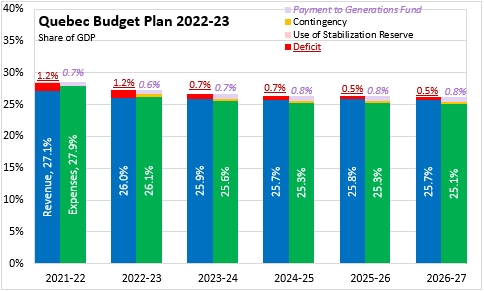The Economics and Statistics Division maintains archives of previous publications for accountability purposes, but makes no updates to keep these documents current with the latest data revisions from Statistics Canada. As a result, information in older documents may not be accurate. Please exercise caution when referring to older documents. For the latest information and historical data, please contact the individual listed to the right.
<--- Return to Archive
For additional information relating to this article, please contact:
March 24, 2022QUEBEC BUDGET 2022-23 The government of Quebec has released its 2022-23 Budget on March 22, anticipating a deficit of $6.45 billion after a contribution of $3.445 billion to the Generations Fund. Quebec's deficit was $6.133 billion in 2020-21, after a $1.221 billion contribution from the Stabilization Reserve and a payment of $3.457 to the Generations Fund. Quebec's deficits are projected to narrow in the coming years, after larger payments are made to the Generations Fund. Revenues are projected to grow by 3.1% per year from 2022-23 to 2026-27 while expenditures (including COVID support payments in the near term) are expected to rise by 2.4% per year. Quebec's Budget includes a contingency allowance of $2.5 billion in 2022-23 and $1.5 billion in each of the subsequent fiscal years.

Quebec's revenues (+$12.9 billion) and expenditures (+9.6 billion) were both substantially higher than anticipated in 2021-22. The 2022-23 fiscal plan assumes that revenues continue to grow from these elevated levels while expenditures remain flat (-$400 million) before starting to grow through 2026-27. Both revenues and expenditures remain considerably higher than were anticipated in the 2021-22 fiscal plan.

Before making contributions to the Generations Fund, Quebec's revenues are expected to exceed expenditures by 2023-24. This is an upgrade from the balance projected in last year's fiscal plan.

The footprint of the Quebec government in the economy was 27.9% of GDP in 2021-22. For 2022-23, this is projected to shrink to 26.1% of GDP as economic conditions normalize. In subsequent fiscal years, the footprint of the provincial government in the economy is projected to shrink further to 25.7% by 2026-27.
Quebec's projected deficit for 2022-23 amounts to 1.2% of GDP, but this comes after making a contribution to the Generations Fund valued at 0.6% of GDP.
Quebec's net debt is currently estimated at 39.8% of GDP at the end of 2021-22. This is projected to shrink in the coming fiscal years, falling to 36.6% of GDP by 2026-27.

Quebec's provincial expenditures amount to just under $16,000 per capita in 2022-23 plus a contingency of $288 per capita while revenues amount to $15,941 per capita. The contribution to the Generations Fund in 2022-23 is $397 per capita while the deficit is $742 per capita. Expenditures per capita are projected to grow to $17,097 by 2026-27 while revenues per capita rise to $17,511. The per capita deficit is projected to shrink over time to $308 per capita by 2026-27 while the contribution to the Generations Fund rises to $554 per capita.

Quebec's economy is estimated to have grown by 11.3% in nominal terms (6.3% real) in 2021. As conditions normalize, Quebec's real GDP growth is projected to converge back to trend rates over the next two years - rising by 2.7% in 2022, 2.0% in 2023 and 1.5% thereafter. Quebec's nominal GDP growth is also forecast to decelerate to 6.4% in 2022, 3.5% in 2023 and 3.4% thereafter. In the near term, Quebec's economic growth is expected to be sustained by household consumer spending and non-residential investment while residential investment activity slows. Export growth is also expected to supplement domestic demand. The Quebec economic outlook cautions that there are numerous risk factors that may influence the path of economic growth, including: inflation, tight housing markets, supply chain constraints and the uncertain outcomes resulting from the Russian invasion of Ukraine.

Key Measures and Initiatives
Quebec's Budget focuses on restoring health and social services, responding to short term price increases and laying the groundwork for future economic growth. Of note, the provincial government will provide an automatic one-time payment of $500 to adults with less than $100,000 in income to cope with rising living costs. Many of the government's other priorities are supported through multi-year initiatives such as:
- Increasing affordable housing through rent supplements, renovations to low-rent housing stock, construction of affordable units and acceleration of the AccèsLogis program
- Modernizing and restoring health care while expanding available services such as home support, preventative health, clinics for complex diseases and front line services
- Strengthening supports such as mental health services for youth at risk
- Boosting productivity through research and innovation funding as well as digital infrastructure and skills development
- Regional development in bio-food industries, wildlife capital, tourism as well as broader supports for the cultural sector
- Updating the Green Plan for 2030 with investments in contaminated land, energy transition and sustainable practices
- Funding for community organizations
Quebec Budget 2022-23
<--- Return to Archive